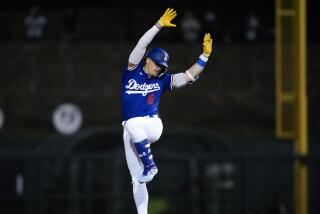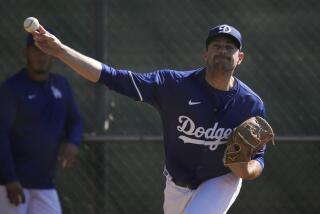Whatever happens, Kenley Jansen is facing heart surgery
Kenley Jansen knows that when the Dodgers’ season is over, whether it’s after a defeat in the National League Championship Series or after another trip to the World Series, he will undergo another heart surgery. It has loomed for a couple months, positioned in the back of his mind as he navigated through less relevant struggles on the mound at the end of the regular season and rebounded with a typical stellar postseason.
“I feel like I have two different personalities in me right now,” Jansen said before Game 6 on Friday. “One that wants to do the surgery already and then another one who wants to go out there and compete to help your team.”
Jansen, 31, has again served as the bullpen backbone the Dodgers have needed — and the one the Dodgers steadfastly believed would surface despite his late-season stumbles. The right-hander has tallied 5 1/3 scoreless innings in the playoffs after pitching to a 5.71 ERA and giving up seven home runs in his final 18 regular-season appearances after coming off the disabled list in August. He’s throwing harder with more rest and said he’s feeling fresher than a year ago, when the Dodgers relied on him for a strenuous workload through Game 7 of the World Series.
Part of his October resurgence is tied to figuring out the proper medication dosage for his heart. It was a problem initially. The medicine left him lethargic. He lowered the dosage until he found the proper amount. Playoff adrenaline, the kind Jansen has always fed off, has helped.
“I try to not, you know, think too much about it and keep telling myself this is where we are right now,” Jansen said. “We’ve been talking about this the whole year, trying to win a championship, and here we are...You can’t take anything for granted and keep focusing on one game, and everything will take care of the rest.”
Selig throws out first pitch
Retired commissioner Bud Selig, 84, who brought the Brewers to Milwaukee in 1970, threw out the ceremonial first pitch Friday. He bounced it.
Selig often said fans should have “hope and faith” in their team at the start of spring training, and he instituted a revenue-sharing program under which owners of teams in large markets contribute hundreds of millions of dollars each year to teams in smaller markets.
He declined to criticize the tanking phenomenon, in which teams sacrifice winning for a few years in hopes of building a contender down the line. It’s a gamble and the results have been mixed.
“It’s hard to be critical,” Selig said.
Selig recalled that Hall of Fame executive Branch Rickey, best known for signing Jackie Robinson to play for the Brooklyn Dodgers, had told him most rebuilds take three to five years.
“Tell me another way, especially if you’re in a medium-to-small market, but even in a big market, that you can rebuild if you don’t have a farm system that’s producing top-notch talent,” Selig said. “There is no other way.”
The Brewers play in the smallest market in the major leagues. They finished 30 1/2 games out of first place two years ago. In two moves last winter that defied the tanking orthodoxy, they signed outfielder Lorenzo Cain for $80 million, the largest contract in franchise history, and they traded their top prospect for outfielder Christian Yelich, the presumptive NL most valuable player.
Selig was also asked about another issue plaguing the sport and fogging its future: the game’s pace. He lamented the average game time ballooning to over three hours a decade after it was well under three hours. It’s a trend his successor, Rob Manfred, has attempted to remedy. He finally found some results this season, when the average game time dropped from 3:08 to 3:04. Selig believes there is room for improvement.
“There are a lot of things that they can do,” Selig said. “I keep being reminded by guys who played the game for years: they never stepped out of the box; nobody ever allowed them to step out of the box. They were things that I didn’t like, and I worried about what it would do to the game, like pitch clocks, but we’re living in a different generation. They’re very sensitive. If we can get it back to 2:45, I’d be very happy.”
Twitter: @jorgecastillo
More to Read
Are you a true-blue fan?
Get our Dodgers Dugout newsletter for insights, news and much more.
You may occasionally receive promotional content from the Los Angeles Times.








